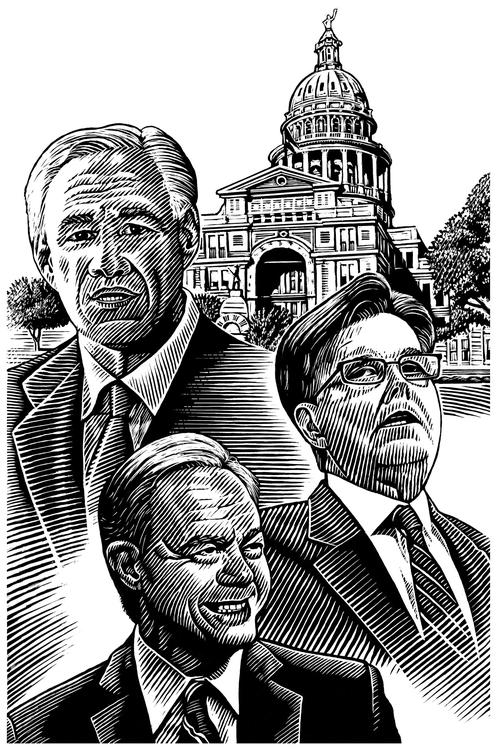God Save Texas: A Journey Into the Soul of the Lone Star State (21 page)
Read God Save Texas: A Journey Into the Soul of the Lone Star State Online
Authors: Lawrence Wright
Tags: #politics


hen Frederick Law Olmsted passed through Texas in 1853, he became besotted with the majesty of the Texas legislature. “I have seen several similar bodies at the North; the Federal Congress; and the Parliament of Great Britain, in both its branches, on occasions of great moment; but none of them commanded my involuntary respect for their simple manly dignity and trustworthiness for the duties that engaged them, more than the General Assembly of Texas,” he wrote. This passage is possibly unique in the political chronicles of the state. Fairly considered, the Texas legislature is more functional than the U.S. Congress, and more genteel than the House of Commons, but a recurrent crop of crackpots and ideologues has fed the state’s reputation for aggressive know-nothingism and proudly retrograde politics.
Molly, who died in 2007, would have loved writing about Mary Lou Bruner, a seventy-year-old retired schoolteacher from Mineola, who in 2016 ran as a Republican for an open seat on the Texas State Board of Education. Because 10 percent of the public school students in the nation live in Texas, the state exerts a great influence on the textbook-publishing industry. During her campaign, Bruner posted on Facebook that Barack Obama had worked as a male prostitute in his twenties. “That is how he paid for his drugs,” she reasoned. Bruner went on to assert that climate change is a “ridiculous hoax,” school shootings are caused by students being taught evolution, and dinosaurs are extinct because the ones on Noah’s Ark were too young to reproduce. Somehow, she lost a runoff.
For several years, like many reporters, I had been receiving emails from a man named Rob Morrow. He claimed that George H. W. Bush was “a seriously addicted homosexual pedophile,” who also was involved with a CIA drug-smuggling ring with the Clintons. In 2011, Morrow took out a full-page ad in a local newspaper:
Morrow, 53, a Princeton graduate with an MBA from the University of Texas, describes himself as an independent investor. In 2015, he wrote a book with the political provocateur and Donald Trump adviser Roger Stone, called
The Clintons’ War on Women.
The
Austin American-Statesman
noted that it “appears to be serving as a playbook for Trump” in his attacks on the Clintons. (Upon its publication, Trump tweeted, “The latest book on Hillary—Wow, a really tough one!”)
In March 2016, Morrow was elected the Republican Party chairman in Travis County. He tweeted, “Top priority for Travis GOP: beautiful Big Titty women!!” Morrow began popping up everywhere, wearing the tricorne motley fool hat that he started sporting after his victory. Mainstream party officials were mortified. They promised to “explore every single option that exists” to remove Morrow from power. Morrow responded, “They can go fuck themselves.”
My friend Steve Harrigan was part of a history panel that was discussing his latest novel,
A Friend of Mr. Lincoln,
when the newly elected GOP chairman showed up. In the middle of a sober discussion about the Lincoln administration, Morrow asked, “How many of you would agree with me that Lyndon Johnson was responsible for the assassination of John F. Kennedy?” One of the startled historians asked if Morrow had any proof. He didn’t, but he claimed that there were numerous other murders that the Bushes and the Clintons had committed or covered up.
Texas Republicans were already having an unhappy time of it in 2016. Perry, now an ex-governor, was KO’d early in the presidential primaries, and Senator Cruz—“Lyin’ Ted”—was overmatched by Donald Trump. Compounding the humiliation, Rob Morrow announced that he was running for president himself. That turned out to be against the rules for the Travis County chairman. In August, Morrow was deposed.
That month, Trump campaigned in Austin. Morrow protested his party’s nominee by carrying a giant red sign saying:

a play that was set in the Texas House of Representatives, my favorite political body. The hero was a rancher from West Texas who represented House District 74, which in real life stretches across thirty-seven thousand square miles—making it larger than the state of Indiana. While I was researching the subject, I met in Austin with Pete Laney, a Democrat and a cotton farmer from Hale County, who was Speaker of the House at the time. Laney was known as a scrupulously fair and honest leader who inspired a bipartisan spirit among the members. The grateful representatives called him Dicknose.
Laney was inspired by an actual law passed in 1991, allowing sewage sludge from New York City to be shipped by train to Sierra Blanca, a little desert town in District 74, ninety miles southeast of El Paso. The train became known as the Poo-Poo Choo-Choo.
“Another thing,” I said. “I’d like my lobbyist to take some legislators on a hunting trip. What would they likely be hunting?”
“Pigs,” said Laney.
“Pigs?”
“Wild pigs. They’re taking over the whole state!” Laney said. “You ever seen one? Huge. They got these tusks out to here.”
“How do you hunt them?”
“Well, I don’t hunt ’em myself, but I got a friend who does.” He punched an intercom button on his phone. “Honey, get Sharp on the phone,” he said.
In a moment, John Sharp, the state comptroller of public accounts (now chancellor of the Texas AM system), was on the speaker. “Sharp,” said Laney, “I got a young man here wants to know how you hunt pigs.”
“Oh!” Sharp cried. “Well, we do it at night, with pistols. Everybody wearing cutoffs and tennis shoes. We’ll set the dogs loose, and when they start baying we come running. Now, the dogs will go after the pig’s nuts, so the pig will back up against a tree to protect himself. So then you just take your pistol and pop him in the eye.”
And these were progressive Democrats. More or less.

JANUARY 2003,
the Republicans took over the Texas legislature, for the first time in 130 years, and Laney lost the Speakership—to Tom Craddick, a Midland Republican. More than anyone, Craddick was responsible for gaining a Republican majority in the House. “There were eight Republicans in the House when I got elected, in 1969, and one in the Senate,” Craddick told me. “The first time I tried to introduce a bill, they told me I couldn’t, because I was a Republican.”
I once lobbied Craddick, when he was Speaker, to make Camp Mabry—a Texas State Guard facility in the heart of Austin, eight hundred acres of poorly used and superfluous training ground—into our version of Central Park. Craddick was going to make it a Speaker’s bill, but then he lost the gavel to Joe Straus, who has shown no interest in my park idea. It’s still a project of mine.
Craddick is slight and white-haired, wry and friendly, with a bit of slur in his speech and a shuffle in his step. He’s easy to miss in the crowd of vigorous young legislators, few of whom were in office when Craddick turned the House into a Republican domain. His crusade started in the late 1980s. The party had practically no infrastructure, so Craddick helped to organize campaigns for the candidates, requiring them to report to him how many doors they had knocked on and how many mailers had been sent out. In 2002, Republicans finally got control, and the coup was complete. Craddick became the first Republican Speaker since Reconstruction. “But it wasn’t just about winning elections,” he told me. “We had a redistricting plan.”
In those same 2002 elections, 56 percent of Texans who voted for a U.S. representative chose a Republican, but Democrats nevertheless held more seats—seventeen to fifteen—in the U.S. House. Craddick worked with Tom DeLay, from Sugar Land, near Houston, who was then the majority whip, to put into motion a sweeping plan to create a permanent Republican majority in the U.S. House.
Under Craddick’s leadership, the Texas legislature began carving historic congressional districts into new fiefdoms. Taking care not to violate Supreme Court guidelines on minority representation, lawmakers jigsawed Texas into shapes that would decisively capture the state for the right.
In May 2003, the redistricting plan came up for a vote in the Texas House. Unable to block it, more than fifty Democratic members of the Texas House fled to Oklahoma. The next morning, when Craddick gaveled the House to order, he realized he didn’t have a quorum. He locked down the capitol chamber to prevent any more defections and called out the state troopers to hunt down the missing members, who became known as the Killer Ds.
In the midst of this hubbub, Pete Laney, the deposed Speaker, flew his Piper turboprop from the Panhandle to Ardmore, Oklahoma, where he joined his colleagues at the Holiday Inn. Someone in DeLay’s office got Laney’s flight plan from the Department of Homeland Security by claiming that Laney’s plane was “overdue” and might have crashed or been seized by terrorists. Soon, Texas troopers and national reporters were swarming into Ardmore, but the defiant Democrats stayed put until the session ended without a vote on redistricting. Governor Rick Perry called a special session for late June, whereupon eleven state senators fled to New Mexico. It took two more special sessions to ram the vote through.
The fruits of Craddick and DeLay’s Republican revolution can be seen in the current Texas delegation to the U.S. House of Representatives: twenty-five Republicans and eleven Democrats, a far more conservative profile than the actual political demography of the state. The Austin metro area, the heart of liberal Texas, was divvied up into six congressional districts, and only one elected representative is a Democrat. I’m now represented by Roger Williams, an automobile dealer from Weatherford, two hundred miles north of Austin. Another congressman, Lamar Smith, lives in San Antonio, but his new district sweeps in the University of Texas in Austin. Smith, a member of the Tea Party caucus who denies that human activity affects global warming, heads the House Committee on Science, Space, and Technology, which oversees NASA, the Department of Energy, and the Environmental Protection Agency. (In November 2017, Smith announced he would not run again.) Lloyd Doggett is the only Democrat representing the Austin area, and his district runs along I-35, from East Austin to East San Antonio, scooping up as many Democrats in one basket as possible.
The redistricting process that took place in Texas has since been replicated in statehouses around the country, creating districts that are practically immune to challenge and giving Republicans an impregnable edge. “Texas became a model for how to get control,” Craddick told me.
In 2005, DeLay was prosecuted for money laundering and conspiracy in connection with the illegal use of corporate funds related to financing Republican candidates in Texas. Craddick was also questioned, but he was never indicted. DeLay’s conviction was overturned on appeal, in 2013, but by then he had resigned from Congress and made an unexpected appearance on
Dancing with the Stars.
The show has become a pathway for redemption for disgraced Texas politicos. Rick Perry, who was also indicted—in 2014, for abusing his power as governor—was also cleared, and also celebrated his comeback on
Dancing with the Stars.
Now he heads the Department of Energy. I wonder if Ted Cruz can dance.